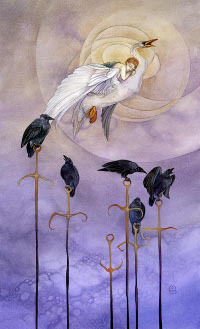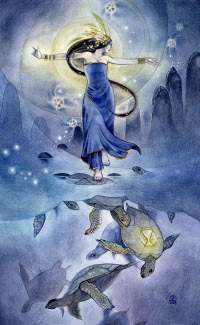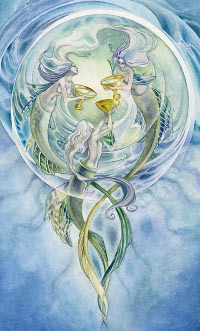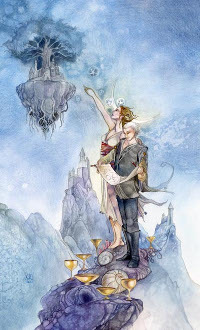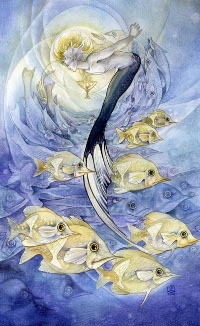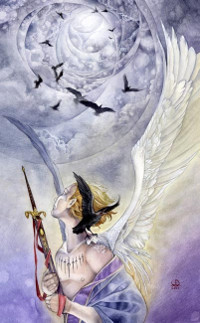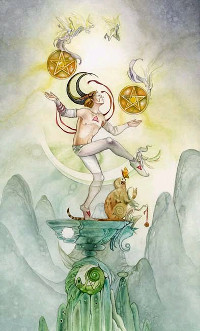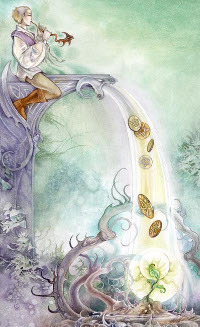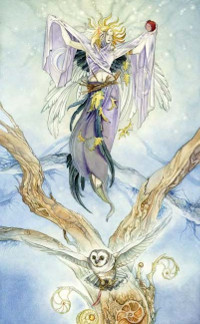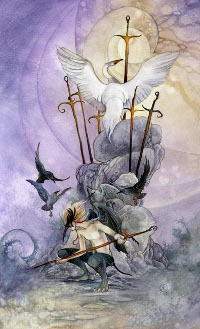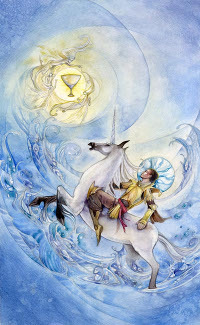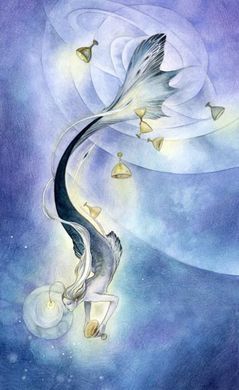The Sacred Days of Vernal Equinox Spread: The Shakespeare Tarot
Note: because my life is somewhat quotidian and readings for oneself, while often informative for the querent, can be confessional and rather boring to the outside viewer, I have decided that the cards I pull for the Vernal Equinox will comment on the global political and social events of the day.
Day 1: 15.3. Cybele and Attis Festival - Today is the first day of week-long celebration of Cybele, the great Mother Goddess, and her youthful consort Attis. Today's card talks about love and eros in your life, and how you can celebrate them.
This is the 9 of Coins card, represented by Portia from
The Merchant of Venice. Given today's allocation to the great mother goddess of creation, Cybele, my initial interpretation of this card focused on it's surface - namely, the beautiful landscape of earth, air, and sea before which stands Portia. Her image here is of Venus, taken from Botticelli's painting
Primavera. Venus was Aeneas' mother, and the Romans adopted Cybele as their own, conflating her with Venus and her son Attis with their Trojan founding father, Aeneas.
Portia, like a scale of justice, holds in her hands 2 items - her beautiful estate Belmont and herself dressed as the fake law expert, Balthazar. House and home - hers at any rate - seems to outweigh legal concerns, and my immediate response was to see this card as representing the thousands of children leaving school today in hundreds of countries to protest the political inaction of the adult world on issues of Climate Change. The protests were sparked by the impressive 16-year-old Swedish activist, Greta Thunberg, recently nominated for a Nobel Prize (the Thun in her name is derived from the Italian name Anthony, itself derived from the smallest pig in a litter - the
tantony - connecting it with the name Portia, derived from Porcus, meaning pig; Anthony, of course, is the name of the merchant of Venice). It will be remembered that the so-called justice in Venice is fake, and Portia - like Greta - takes matters into her own hands. The beautiful landscape as it turns out is a tapestry, what lies behind it is anyone's guess. Being a coin card, everything here hinges on money - it's the wealthy who have their way. The Jewish Star of David alludes to Shylock's attempt to get to the heart of the matter, and the scapegoat the Jewish people have been made historically for the sins of Western Society.
This, then, brings me to the 2nd, deeper suggestion this card holds for the Ides of March (it may be worth noting today, on the anniversary of Caesar's assassination, that Brutus' wife's name was Porcia; what's more, Brutus was Caesar's son, just as Aeneas' son was named Brutus, who went on to found New Troy - Britain). It's the white wealthy Christians who run the prosperous trading city-state of Venice; the underclass Jews are tolerated insofar as they can be exploited by the ruling class.
The Merchant of Venice, with its prominent Jewish question, is intimately paired with one other Shakespeare play, also centred around Venice, namely:
Othello, and its prominent question of race. In Christchurch this morning, a White Nationalist shot and killed 49 Muslims attending mosque. This white-wing extremist, praising Donald Trump, called for the death of all people of colour and the Jewish financial cabal that runs the world. As it happens, today also sees thousands of school kids protest in America against the abhorrent scourge of gun violence in that country, on the anniversary of the Parkland school shooting. Guns are a distinctly male way of taking the law into one's own hands, and yet also reflects what really rules our world: violence. Its outcome is the desolation the tapestry's beautiful scenic splendour conceals.
Day 2: 16.3. Gahambar Hamaspathmaidyem - Today begins the Zoroastrian Holiday Gahambar Hamaspathmaidyem, celebrating the life cycle of human beings, from creation to death, and the presence of angels. Today's card connects you to your own path in life and the angel/power/energy that protects you.

Today's card is the Ace of Swords. On it is represented all manner of bladed weapons, as well as quills and paper, stressing the word aspect of swords - thoughts, discernment, evaluation. Feathers are gotten from birds, alluding to the suit of Air. The news is replete today with talk of the mosque shooting in New Zealand. That act of terrorism is represented in the foundational card of the suit of violence, and the word aspect highlights the incessant commentary and reflection going on around the world today. It also underscores the sub-culture of hate speech and radical indoctrination permeating the internet. The murderer live-streamed his assault on Facebook and released a web-savvy manifesto which coincided with his rampage. One of the attributes being discussed today about this manifesto is its "meme-ability", designed to facilitate mass promulgation. Another device it utilizes is irony, a device used by the alt-right to claim deniability. A similar linguistic tactic is to use outrageousness to destabilize rational debate, divert attention by being "entertaining", and make the unthinkable thinkable.
This doesn't seem to have much to do with Zoroastrianism, except that it's a very black & white, Manichean religion. Curious about the accuracy of my card interpretation, I pulled another, hopefully focusing on a more personal angle - the card I got was the Queen of Staffs - Viola
Viola's boat is destroyed and she washes up on a foreign shore. Here, she is in an opera house, which looks a little like a mosque. I took this to represent the Muslim refugees in Christchurch, integrating into their new homeland.
Curious about the killer himself, I pulled another card -
This is the 10 of Swords - Coriolanus. He is a man twisted with hate and a merciless purveyor of violence. He hates politicians, despises the average person, and is literally ripped to pieces in a neighbouring country.
Day 3: 17.3. Liberalia - On this day, the Romans celebrated the Liberalia festival of freedom. Today's card tells you how you use your freedom and encourages you to be really free of bonds that limit your personality, talents and longings. What are the bonds you have to break to be free?
Being Sunday, and a slow news day, I decided to focus on the fact it's St. Patrick's Day. Saint Patrick liberated Ireland from snakes, even if while doing so he infested the island with Catholicism. I decided to pull a card which would comment on the ongoing Brexit issue of a hard-border between North Ireland and the Republic, and what it will all mean in the long run. I pulled The Magician/Prospero -

Prospero was the Duke of Milan, who was usurped and exiled by his brother with the help of the Duke of Naples. A tempest occurs which shipwrecks Prospero's brother on his exiled island. Through the use of magic, Prospero is reinstated as rightful ruler. Atop Prospero's staff is the emblem for Milan, but it could be the emblem of Ireland - the tail of a snake (St. Patrick) with its head a tongue (Irish Blarney). How I read this card vis-a-vis the tempest that is Brexit is that, in the long run, N. Ireland will be somehow reunited with the south. Rightful rule will be returned to the island, as seen between the continental concerns of Prospero and his brother and the marriage of Prospero's daughter and the Duke of Naples' son, and also in the magical island being returned to Caliban at the play's end. It will be remembered the island belonged originally to Caliban the primitive as well as Ariel the muse - Ariel did Prospero's bidding while Caliban rebelled against him. How this unification will transpire is unclear, or even if it will be the complete absorption of N.I. into the Republic, but it seems certain it will necessitate some sleight of hand.
unsure if I was reading this card right, I pulled a second to further comment on it -
This is the 8 of Cups - Alcibiades from
Timon of Athens. Alcibiades was a general who was unfairly cast out of Athens. Exiled, he raised an army and conquered Athens - his retribution was to exile all those politicians who exiled him. The similarity with this story and Prospero's appears to corroborate the idea of a unified Ireland. Perhaps Brexit will cause an economic and/or political crisis in Britain such that N. Ireland will unite with the Republic to save itself?
Day 4: 18.3. Ugadi - The Hindu holiday Ugadi is celebrated in some parts of India as New Year. Its traditional food represents the different tastes: sour, salty, sweet and bitter. Today's card shows you how to balance the flavours in your life, to be able to enjoy it to the fullest in the months ahead. How can make you make your life more flavourful and enjoyable?
The foremost headline when I awoke today concerned a shooting in Utrecht. It seemed to be an act of "terrorism" perpetrated by a Turk. At the time of this writing, he is still at large. The card I pulled regarding this incident was The Emperor -

At first, I was a little baffled by the card's relevance. The Emperor concerns mundane power of the male persuasion, but the comical aspect of Falstaff seems miles away from religious and ideological divides. But then I remembered who Falstaff was in real life - his name was John Oldcastle, and he was a 15th Century Lollard. Lollardry was a religious reform movement antagonistic to the Catholics, and Oldcastle was a military man who was considered a heretic. Eventually placed in the Tower of London, he escaped and became the leader of the Lollard rebellion. He avoided capture for years but was eventually captured and executed. Oldcastle's proto-Protestantism was the same religious schismatic which divided Europe during the Reformation of Shakespeare's 16th Century. I assume then that the shooter in Utrecht was acting on religious beliefs, in all likelihood in response to the mosque shooting in New Zealand. Like Oldcastle, it seems the shooter had been in the military. As for how Shakespeare chose to portray Oldcastle in the comic Falstaff, perhaps it suggests that we in the West are not taking Muslim concerns seriously or are otherwise misrepresenting them.
With an eye to how one should approach the news of these recent acts of violence and the Ugadi idea of how to find balance in the New Year, I pulled a second card for clarification -
This is the 2 of Swords Volumnia. It relates directly to the 10 of Swords Coriolanus I drew about the Christchurch killer Saturday. Here, Coriolanus' wife, son, and mother supplicate the murderous military man for peace. It is a card which pleads for civility, concord, and the cessation of violence as a solution. It takes place in Rome, the epicentre of Christianity.
Day 5: 19.3. Eostre/Ostara - The Germanic goddess of spring is celebrated with eggs, rabbits and the ringing of bells. Today's card reminds you of a bell ringing in your life, a bell that calls you forward and that you didn't heed or overhear until now. Understand what this bell wants to tell you, and in the coming month, try to make its voice heard.
With no news item particularly taking centre stage today, but with above readings touching on religious schism, I decided to pull a card concerning Pope Francis, the clergy abuse scandal, and the recent summit on sexual misconduct held at the Vatican. The card I pulled was the King of Cups Henry V -
First of all, The King of Cups is associated with the water signs, and the Shakespeare Tarot specifically links it with Pisces. There are 2 Henry Vs - the young reprobate Hal who dives into the underworld of the lower classes, and the king Henry V who is all surface. The pope wears the Ring of the Fisherman, as the first pope, Peter, was a fisherman who became a fisher of men; Christ and Christianity are represented by a fish; the Christian church dominated the last 2000 years, the Piscean age.
This said, the King of Cups is a card about deception, manipulation, and historical revisionism.
Henry V begins with the church fathers debating the legality of England invading France - the king has come to them for their blessing and they decide to give it, not on moral grounds but quite the contrary - for their own personal gain. Henry's reasons for invading France are also unethical. At the famous battle of Agincourt, Henry is the first king in recorded history to break the Chivalric code and murder captured prisoners in cold blood. Henry is a master manipulator, finely attuned to controlling the hearts and minds of those around him and his nation. The play itself continually points out the discrepancies between Henry's stated motives and intentions, and underscores it all with a chorus which appears between acts to report the official story to the audience - a story blatantly contradicted by the actions on stage.
I can't help but view this card in relation to the current situation with the Pope and his abusive clergy as little more than an exercise in Public Relations damage control. Perhaps Francis means well, but his first allegiance seems to be less with God than with maintaining the outward credibility of the church, and less the morals and more the morale of his rank and file Christian soldiers. One thing I would note about
Henry V - it's a very male-heavy play. Almost the only female in the play is Katherine, the Princess of France, and all the rest are the happy band of brothers. Just before Henry rashly attacks France, word comes of a settlement with the French king which, besides giving in to most of Henry's demands and so avoiding needless bloodshed, offer's Henry Katherine's hand in marriage. With no glory and certainly no vainglory in that, Henry attacks France anyway, taking it and Katherine by force. The ludicrous scene of Henry "courting" Katherine, when she is nothing more than his booty, speaks I believe to the abuse of nuns which has gone unchecked in a conspiracy of silence very similar to those clergymen who have abused children. The lack of females in
Henry V and the total denial of any female power in the play point to the culture of an all-powerful male priesthood.
All this has little to do with today's allocation of Eostra, except she is a female diety, compelling one to hear what's been unheeded. Most churches have bells - in fact, the Church is the Bride of Christ, hence His
belle - and really, what's a bell but an upside-down cup?
"Woe to you teachers of religious law- Hypocrites! You are so careful to clean the outside of the cup but inside you are filthy - full of greed and self-indulgence!" (Matthew 23:25)
Day 6: 20.3. Spring/Vernal Equinox - This is the day of balance between day and night, when new things grow and push through the earth, when Kore/Persephone returns from the underworld and brings flowers with her. Today's card calls you to contemplate on creativity and renewal in your own life. Where do you resist change, and where should you embrace it?
Unsure of what to focus on today in the news, I decided to pull a card concerning the recent 4-hour documentary
Leaving Neverland, which reveals Michael Jackson to be a paedophile. The card I pulled was The Hierophant William Shakespeare -
The mix of black and white on the card reminds me of the album cover of Jackson's
Bad. Looked at another way, it's a bit of pap. I must confess, The Hierophant is my least favourite card in the Shakespeare Tarot. Having attended Catholic school but not being a Catholic myself, my opinion of the pope and organized religion is severe but accurate. Here, The Hierophant card represents William Shaksper, the man Stratfordians have for centuries erroneously attributed the works penned under the nom de plume William Shake-speare. On the left of the card are a number of trinkets one can purchase in Stratford upon Avon, which has become a mecca of bardolatry and an outsized gift shop. In this reading, Stratford could be said to symbolize Jackson's fairy-tale ranch, Neverland, and Stratfordianism the millions of dollars tied up in both men's legacies. On the right of the card is Edward de Vere, the true author who wrote surreptitiously under the name William Shake-speare. The Hierophant is a fraud, claiming to represent God, and the card itself represents a massive cover-up.
Jackson was the so-called King of Pop(ery); de Vere was nobility (some Oxfordians even conjecture he was the son of Queen Elizabeth I). As a young man, de Vere dressed outrageously. Not only did he have bisexual leanings but returned from Italy with a young boy who remained close to de Vere despite allegations of sodomy. Like Jackson, de Vere was charged with a handful of crimes and - even as he spent time in the Tower of London - he always went free. In a college play of the time called
Return to Parnassus, Shakespeare is ridiculed for talking too much about Ovid and Persephone. Parnassus is the Greek wellspring of the muses where Shakespeare, quoting Ovid, claims he drinks from in
Venus & Adonis. Persephone's other name is Kore, as in core: the pith and the root. Curiously, today is the Vernal Equinox, the reason for this seasonal reading, and de Vere has in his name the Latin for spring:
ver. Writers of the day and Shakespeare himself used the term
Ver as a double entendre for the true author, and today we move from d'iver to ver. Ver also means "truth", as in verity and de Vere's motto: Vero Nihil Verus -
Nothing Truer than Truth. What's more, the word
never - as in Neverland - along with
ever (
ned &
ed vere) were also code words used by the author to refer to himself. When de Vere was dead but Shaksper was still alive, Shakespeare was referred to by those in the know as "ever-living" - not a thing one says of the living - while the title page of the
Troilus & Cressida 1st quarto reads: "A never writer to an ever reader: news".
News, indeed - the 2 men who were abused as boys by Jackson testified in Jackson's defence during his lifetime against allegations brought forth by other boys. At the time I remember rationalizing that although Jackson's behaviour was suspicious, he himself was like a child, these boys close to him adamantly denied any misconduct, and heck, there surely are some parents out there who would exploit their children to get their hands on some of Jackson's money. That kind of thinking now seems naive, self-delusional, and ignorant, just like the arguments for William Shaksper of Stratford.
Day 7: 21.3. Harmony Day - In Australia, Harmony Day celebrates inclusiveness and acceptance. Today's card asks you to probe your own hidden prejudices, and what you can do to become more open and tolerant. Challenge yourself to inform yourself and get to know cultures, topics or people that until held irrational negative associations for you. How can you become an ambassador for inclusiveness and harmony in your society and immediate surrounding?
Taking today's suggestion to heart to get to know topics and people that hold negative associations for me, and today being another slow fake news day, I decided to pull a card for Donald Trump. The card I pulled was The 10 of Staffs Richard III

Richard III is of course not only Shakespeare's most obvious villain, he is probably one of the greatest, in fact he is the greatest villain of all time. really big. Just incredible. Here, the deformed Richard stands in front of a violent melee of his own making, holding a hobbyhorse like a child. Richard is based in part on Robert Cecil who was, unlike the real Richard, a hunchback. Like Donald Trump, Robert Cecil attained his status with the help of his powerful father, Lord Burghley. Richard got to be king by killing his brothers, killing his nephews, killing numerous other people including his wife, and wooing his niece. Right from the outset of the play, Richard is a creep, and he only gets worse. Of course, it's a very entertaining worse - he tells us the audience of his evil intentions as if we were his co-conspirators, and so in a sense we are. "Since I cannot prove a lover" he says, "I am determined to prove a villain" recalling to mind Trump's elegant words "I don't even wait. And when you're a star, they let you do it. You can do anything. Grab them by the pussy. You can do anything."
Incidentally, President Lincoln loved Shakespeare, and
Richard III in particular. Residents of Richmond, Virginia, saw Lincoln as a tyrant and hoped Richard's line "I should not live long after I saw Richmond" would apply to the president. Two weeks after visiting the defeated Virginia city, Lincoln was assassinated in a theatre by John Wilkes Boothe, a Shakespearean actor who had played both Richard and Richmond. Having shot the President, Booth cried out the state motto of Virginia (named for Shakespeare's Queen Elizabeth): "Sic semper tyrannis" I'd say let's hope for a similar fate for Trump, president of the rich, but in the interest of inclusiveness and harmony, his death would only see Pence take his place. SAD.
Curious about the bevvy of contenders throwing in their hat to run against Trump for the Democrats, I decided to pull a card indicating how that race will turn out. The card I pulled was Death Titus Andronicus -
This couldn't be more perfect. The Democratic presidential primaries will end, like
Titus Andronicus, with a heap of dead bodies - some baked in pies, some mercy-killed, some buried up to the neck and left to starve. After all the carnage, power falls to Titus' handsome, internet-savvy son, Beto O'Rourke. For the good of the nation, Richard Ojeda will not stop until every human pie is eaten. Undeterred, and undeturd, Wayne Messam will declare: "If one good deed in all my life I did, I do repent it from my very soul." The part of John Hickenlooper will be played by Pete Buttigieg. Theatre buffs will feel the bern. When Elizabeth Warren wins a Tony for her role as Tamora, Queen of the Goths, she will send a Native American in her stead to refuse the award.
It may be worth noting that while
Titus is an incredibly violent play, there are actually more deaths in
Richard III, they just mostly happen off-stage.
Day 8: 22.3. Minerva Day - Minerva/Athene is the Roman/Greek goddess of intelligence, rational thinking and objectivity. Today's card asks you how you use your intelligence and talents, whether you give them the proper place or whether you feel you have undeveloped potential. What can you do to make the best use of your mental powers and intelligence?
With today's emphasis on intelligence, I thought I'd focus on the "collected information of political value" definition of intelligence and pull a card on the Mueller investigation. I had no idea the Mueller investigation would end today with Mueller handing in his report to the Attorney General. The card I drew was The Wheel of Fortune X The Printing Press -

First off, it's a trump card. I've always considered the Wheel of Fortune card in the tarot to be like a "spin again" section of a carnival prize wheel or a scratch-and-win lottery ticket where what you win is a free ticket. This may suggest the investigation doesn't end here, but only leads to more investigations. In The Shakespeare Tarot, the wheel is actually the printing press, which revolutionized society rather like computers and the internet have in our own age. This connection is underscored by the 1 and the 0 of the card's numerical number, 10 - 1 and 0 being the binary code that computer language is based on. How this relates to the Mueller probe is the hacking of the DNC computers, Wikileaks, and the manipulation of Facebook and other social media sites by the Russians. On the WofF card there are numerous books shown - so many that it becomes a jumble, one book blocking another and making it nearly impossible to distinguish any one line of thought. This may suggest the complexity of the investigation, but also certainly suggests the fact that the A.G. will interpret the probe and present its findings to the Senate, but that probably the probe itself will not be made entirely public.
One of the characters on the card is Dogberry - Trump certainly is capable of Dogberry-grade malapropisms - but being a policeman, he could represent Michael Flynn, the former national security adviser who has worked extensively with the investigation. There's Puck, who could be Trump's one-time fixer Michael Cohen, or more likely and less likable the self-proclaimed trouble-maker Roger Stone. Also here is Bottom with the head of an ass, and this could be almost anyone in Trump's inner circle, but is probably Trump's campaign chairman Paul Manafort, in charge as he was of overseeing the rude mechanical's revels. Ben Jonson, who edited Shakespeare's Folio, would be Mueller, trying to make sense of all these divergent storylines. "Honest" Ben is part monkey based on a poem by Jonson called Poet-Ape about a deceiver and fraud who pretends to be something he's not - a poet, when really he's a second-rate huckster.
As to whether this card indicates Trump's guilt or innocent vis-a-vis collusion with Russia is very hard to read. One thing the printing press famously promulgated was Martin Luther's criticism of the Catholic Church and thereby its schism and the great Protestant Reformation. This implies either a rewriting of regulatory laws and practices regarding future political campaigns or an even greater divide between the left and right in America, or more accurately: between the anti- and pro-Trump camps. Hoping for a bit more clarity, I pulled another card: The Star XVII Cordelia -
Another Trump card. This is an explosion of information, but it's hard to make sense of. In
King Lear, goodness and honesty in the person of Cordelia is rejected by the king and the nation proceeds to go to hell in a handbag. Cordelia shows that it will be costly, but eventually the truth will out. Here, she also represents Shakespeare's youngest daughter who helped secure his legacy - therefore maybe she represents Trump's favourite daughter, Ivanka? Taking a different tack, perhaps this card alludes to Kent Starr, the former solicitor general who investigated Bill Clinton and eventually impeached him for lying under oath about an affair. Hoping for a bit more clarity, I pulled another card: Temperance XIV Measure for Measure -
Another trump card.
MforM is a play about law and ethics. Perhaps the play's bedtrick and concern over extra-marital sex reflect Trump's paying off of porn stars? In the play, a nation's ruler retires and places in his stead a hard-headed idealist - I hope this doesn't imply Trump will quit &/or be impeached and Pence will take his place. One thing all these cards have in common is what they're saying in part is that there's too much information at play to make any one clear-cut decision on things. Hoping for a bit more clarity, I stopped pulling cards.
Day 9: 23.3. Hilaria = The Roman holiday of Hilaria celebrates laughter and fun. Today's card throws a light on the place light-hearted fun and humour have in your life. Do you laugh often enough? The card challenges you to find things that make you laugh and forget your worries, and do them regularly from now on.
Because I must stick with my news readings, and because I find the on-going Brexit nonsense borderline hilarious, I decided to pull a card on the governmental disfunction and possible outcome of Britain's divorce from the European Union. The card I pulled was The High Priestess II Elizabeth I -

Elizabeth I is seen here in a kind of cave, which could also be a stage; this may suggest parliament, and being cut off form the real world. The cave seems to be an island, so this may be Britain, cut off from Europe. ERI oversaw exploration to America, so enhanced trade with the US could be implied. ERI was vilified by Catholic countries in Europe, which may indicate how Europeans are beginning to feel about England. ERI undertook the idea of Britain as an empire, so this card may reflect the attempt by Brexiteers to return to Britain's glory days, or it could spell the final nail in its coffin. ERI could allude to today's Queen Elizabeth, but I rather think she alludes to Theresa May. One of The High Priestess' allocations is The Papess, or Queen Joan, the female pope who was discovered and cast out of the Vatican, reviled. This could indicate Theresa May will be unceremoniously cast out of either the Tory Party or Government. Another of the HP ERI's epithets is Astraea, believed to return to earth to usher back in the golden age, or: to make Britain great again. Understandably enough, it was during ERI's reign that the female figure of Brittainia came to signify the personification of Britain. Britain was founded by the Roman Brutus, grandson of the Troyan Aeneas. Brutus figures in Shakespeare's poem
The Rape of Lucrece, which lies at ERI's feet. Brutus made Rome a Republic, which I doubt is going to happen to Britain. Rather, it's more likely the Republic of the EU will reject England and its monarchy, which may be undergoing a rape and seems intent on committing a kind of suicide. That said, ERI is also represented by the Phoenix, which dies and is born again from its own ashes. As it happened, today saw a million-person march in England of people demanding a 2nd referendum on Brexit. Curious what would happen if a 2nd referendum was held, I pulled a card to answer the question: The Fool 0 Launce/Autolycus

This card represents Shakespeare's first Fool, Lance, and his last, Autolycus. And as regards today's allocation of hilarity, it seems we've come full circle. The first fool on the left proudly sports England's St. George cross; a sleeping dog is left to lie. The last fool is being pursued by a bear, and barely has a leg to stand on. He's become a huckster and is on the skids. Really, there is only a slight difference between the 2, but the first fool is walking towards America, whereas the last is headed towards Europe.
Day 10: 24.3. Earth Hour - On this international day, people stop to think about the environment and the use we make of it. Are you doing all you can to keep and preserve this earth? Today's card asks you to find your own connection to the Earth you live on, whether through environment awareness or the voice of your spiritual tradition. How are you connected to this Earth and how can you honour it?
Taking today's allocation as focus, I pulled a card to elaborate on what it is that's preventing humanity from making the imperative changes needed to address climate change. The card I pulled was The Devil XV Othello -

In some ways The Devil Othello card suggests man at war with woman, black against white, evil against good; but in a simpler way, it sees man at war with himself. Aside from everything else going on here, there can be espied a bull's head, indicating the card's affinity with Taurus, implying the self-satisfaction with earthly pleasures. Its eyes are upside-down scales - somehow, maybe through black magic, these scales refuse to fall from these eyes. This hell we are in is an endless labyrinth, suggesting obfuscation and exhaustion. The hands of the man and woman are just barely holding on. Their feotus - which is also the head of an upside-down skeleton - hangs in the balance. At the centre of the card can also be espied a phallus, indicating a man-made world and male hegemony - even as it's excused as in the service of women and the future of humanity. The green-limbed Iago at the top centre of the card orchestrates everything, as both ego and devil, teasing out the hell in Othello and the demon in Desdemona. He is headless, seemingly without motive or aforethought, but just pure impure inclination. The white, or nothingness, which rents his torso open and takes the place of his face is as the phallus' ejaculate, impishly implying orgasmic self-gratification, or what the Victorians called self-abuse.
This all clearly points to the fact we are having too good a time to stop or modify what we're doing, caught up in it like a crime of passion.
Day 11: 25.3. Palm Sunday - The Christian holiday of Palm Sunday celebrates peace, hope and new beginnings. Today's card shows you where you have to make peace - with memories, people in your life or other painful matters. Let them go and don't beat yourself up any more.
I'm not sure why today's allocation is what it is - today is neither Sunday nor Palm Sunday. But given that celebration as a framework, connected as it is with the Holy Land, and with Netanyahu calling short his visit to the States because of renewed strife between Palestine and Israel, I decided to pull a card on the Middle East; the card I pulled was The Lovers VI Romeo & Juliet -

There's a certain comical aspect to pulling this card for this issue. Obviously, no real accord could be accomplished by the individuals Romeo and Juliet, when everyone around them and the weight of history repeatedly insists on the insoluble schism between their families. In the end they kill themselves over the other - for love, for hate, it makes little difference. Funny how Friar Laurence is trying to broker some kind of union here in the crypt - I don't see him as America, but as religion itself - the Judaic religions - trying to mediate matters of the heart and soul but making a hot mess of it. If America is represented, it would be off stage, in the person of Tybalt, a character who is alluded to as the Prince of Cats, playing on the Italian word cazzo, slang for prick. The Tudor rose which crowns the card suggests that some compromise can possibly be reached, involving a truce and integration of both factions. At the moment, however, it's all high melodrama that's fated to end in tears.
Day 12: 26.3. Preparation of the Temple of Luna - On the final day of our 12 days, we prepare for the annual Roman festival in the Temple of Luna, the Moon goddess. Today's card tells you how you can become more attuned to the intuitive, quiet side within you, how you can make your spiritual work more meaningful, and how to integrate your shadow into your life. It's the message of the Moon for the spring days ahead while the influence of the Sun is rising.
With today's final allocation, I pulled a card to signify what kind of attitude to take the global news cycle in the upcoming months. The card I pulled was the Page of Swords Thersites -
This is funny in a couple of ways. One is that I had just thought to myself recently that this is a card I almost never encounter in readings. Secondly, given today's question, it's as darkly sardonic a reposte as one would expect from Thesites himself. The play is
Troilus & Cressida, where every character is an ego-centric hypocrite. Thersites is no less self-centred, but unlike everyone else he admits it. He is a servant of the Greeks warring against the Troyans, forced to participate in a stupid conflict against his will, and hating everyone and everything as a result. Thersites, like the only other somewhat respectable character in the play Cassandra, goes totally ignored. He is a fool character who has been driven mad - but his madness makes sense juxtaposed the insanity of the idiotic warmongers who enslave him. The Page of Swords represents free-thinkers and iconoclasts; the bileous enmity that Thersites drowns in suggests one would do best to respond to this wicked world philosophically, lest one succumb to its lunacy.
Addendum: I found reading for objective news events, as compared with reading for my own subjective life, revealing and entertaining. As fantastic and poetic as Shakespeare can be, he is also a naturalistic writer in many ways, and his works include much observation, history, and news of his day. Out of 20 cards pulled, 11 were trumps - a sign perhaps of Donald Trump's domination of media content, but essentially an indication that the gravity of the concerns at hand demanded a response from the Majors.
.
